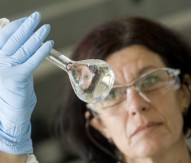
Europe’s global health challenge
Bringing together 1,000 decision makers from academia, politics, the private sector and civil society, the 5th World Health Summit focused on challenges to improving health globally and to foster the development of new solutions. The two-day summit took place under the high patronage of German Chancellor Angela Merkel, French President François Hollande and President of the European Commission, José Manuel Barroso. The conference also discussed a review of the Millennium Development Goals, universal health coverage and the new opportunities presented by e-health.
Addressing delegates in Berlin earlier this week, Barroso outlined cross-border care in the EU in great detail, the importance of healthcare system reforms in guaranteeing the quality of care, and the Union’s contribution to the UN Millennium Development Goals. The President also signalled the importance of the Union’s next research and innovation framework programme in securing the full benefits of the healthcare sector and realising the economic potential the industry can bring. He also emphasised the importance of keeping Europe at the forefront of scientific progress.
“Currently, the health sector already employs 15% of university graduates in the EU and the demand is growing. It is precisely one of the sectors where we have a mismatch between the jobs people seek and the jobs that are on offer. The health sector, not only medical doctors but also nurses and many other professions related to health can indeed be developed in the future. The Commission is keen to encourage the potential of this sector for jobs.”
Partnership
Horizon 2020 will be supported by a series of partnerships between the public and private sectors. This includes European Innovation Partnerships (EIP) and Joint Technology Initiatives (JTIs).
“We have brought together at European level around 1,000 public and private stakeholders in an EIP on Active and Healthy Ageing. This partnership aims to translate innovation into concrete solutions that assist elderly people in living healthy and independent lives, support the provision of high quality care and help our industry to remain competitive. We also support co-operation between large scale industry, SMEs and research organisations in the field of new treatments and diagnostics tools. We have a PPP, the Joint Undertaking on Innovative Medicines Initiative … to which we have dedicated important resources: no less than €1.7bn.”
The next framework programme will also be looking outside of Europe in order to reap the full benefits of international co-operation, as Barroso continued.
“Experience has taught us that bringing the right people together is just as important as the funding, as such. We live in a world of increasingly fruitful partnerships between governments and the private sector, between universities and international organisations. They are proving to be the most effective way of combining the knowledge and creativity that often comes from the bottom-up with the necessary co-ordination and prioritisation to be done at top decision making levels.
“Horizon 2020 draws on that successful formula, aiming not only at supporting collaboration between researchers in Europe but fully open to international networks, building on partnerships with other funders, both public and private, since the scale, scope and ambition of the research and investments for global health cannot be achieved and delivered in isolation.
“The Commission’s flagship research initiatives in this area will be the expansion of the European and Developing Countries Clinical Trial Partnership with sub-Saharan Africa, which already has projects involving 70 institutions in Europe and 185 in Africa, with half of the clinical trials led by African researchers, and IMI with the pharmaceutical industry, the largest PPP in pharmaceutical research in the world.”
Global
The EU is the world’s third largest funder of research on poverty-related and neglected infectious diseases. Under FP7, the Commission invested an annual average of almost €170m in global health research, a trait that Barroso says will continue under Horizon 2020, as the framework seeks to address the so-called ‘grand challenges’.
“Several societal challenges will be addressed, considered priorities under the new programme, including health, demographic change and wellbeing, for which a budget of (around) €7bn has been earmarked. Such research will improve our understanding of the causes and mechanisms underlying health, healthy ageing and disease, improve our ability to monitor health and to prevent, detect and treat diseases, and test and demonstrate new models and tools for healthcare delivery.
“We are optimistic that EU-funded research in the area of health will continue to deliver innovative solutions in the area of biodiagnostics, biotechnologies, and surgical and regenerative medicine building on the success of the living heart valve replacements, the use of spider silk to repair joint damage and the development of simple breath tests to diagnose cancer. These are concrete examples of projects funded by the EU.”
Regulatory framework
Whilst funding is important, the full benefits of innovation will only be fully realised within the right regulatory framework. Brussels has introduced changes to legislation on pharmaceuticals and incentives to develop medicines to help overcome rare diseases. Adjustments to EU legislation governing clinical trials are also expected in order to help guarantee patient safety.
“In the field of research and innovation, good progress has been made to achieve a single market, but there is still a lot of work to do. Investment in R&D is vital, but we need fully functional research and innovation systems to use that money best. We now need all member states and all those involved in research and research funding to make a major push towards a true European research area.
“We also need to grasp the opportunities offered by digital technology. E-health solutions, such as tele-consultations and tele-monitoring, are very promising. They can improve access to healthcare, increase the quality and efficiency of care and empower patients. This is why the Commission has a European e-health Action Plan to increase the uptake of e-health and an e-health network, so that member states can align their efforts and create common policies.”
‘Health, demographic change and wellbeing’ is one of the seven societal challenges under Horizon 2020. The proposals presented by Barroso will be key to realising and adding value to the EU’s continued contribution to global health research.




